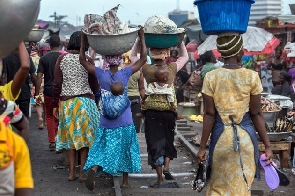The Kayayo: Living carrying baskets. Are these group of people considered in the country? Are their voices heard across the country? Kayayos are popularly seen in the markets of Accra, Kumasi. How about their rights? Kayayos are young girls and women generally from the Northern part of Ghana who migrate to the southern part of Ghana to work in the market of its big cities, and other big towns and tend to carry loads or produce for market women and market patrons.
These loads are generally very heavy and may include foodstuffs like yam, plantain, cartons of drinks, cartons of milk, and among others. Surprisingly, market patrons and people patronizing these products do not consider the age of the kayayo going to carry the produce or load. Sadly, most of these Kayayos are teenagers deprived of various rights such as the right to education, the right to good healthcare, etc.
Ever wondered why young girls from the North move to the southern part of the country to do this job? These girls don't move to the south because they want to but because of some conditions in the North. Since the colonial era, many of its settlements have developed in rural towns. The people are known to be very conservative. Female children are mostly considered as family assets which could be given off as payment of debts.
Some people in the North believe that education is useless to the female child. From a case study by Thomas A. Agana and David Millar (Faculty of Integrated Development Studies, University for Development Studies), it was recorded that about 52.5% of parents in the Northern region would rather allow their female children to marry instead of completing school.
Their conservative nature makes them believe that educated females tend to control their husbands in marriage. They believe that as the female ages, her fertility rate diminishes hence reducing the bride price.
Considering the fact that child marriages are rampant in the Northern sector, teenage girls run from home in order not to be married off to men old enough to be their fathers and grandfathers. Most of these men the girls get married to already have so many wives. Some of these teenage girls are interested in education or learning vocational skills and would want to pursue it but the conditions of the North and the status of the female child in the Northern communities restrict them. In order to save themselves, they run away from home and move mostly to the South.
Girls also leave home and move to the South because of the dire economic conditions of the North. Considering the fact that most people in the Northern part of Ghana are focused on agriculture, issues like climate changes have limited the economic and financial base of families who depend on their farm yields for the family’s upkeep. The girls therefore move to the South to do menial jobs to get money to support their families.
They see the southern sector as a bed of roses. Unfortunately for them, they come to the south only to realize that their friends they looked up to do this kind of job and sleep in the streets, in front of stores, and even in slums. Disappointed, they join their friends to do the Kayayo work.
There are dangers associated with being a kayayo. As discussed earlier, these girls end up sleeping in the market, slums, and in front of stores. These places are not convenient places for teenage girls. They are prone to rape by gangsters, drunkards, and even pedophiles.
Should these girls get pregnant as a result of the rape, there's going to be an increase in street children and illiteracy as these girls cannot take the expenses of educating a child. These teenage kayayo girls are also prone to various diseases like malaria, hepatitis, cholera, and other related diseases.
Social vices are also going to increase in the country: Social vices including prostitution and armed robbery. Children from these kayayo girls will tend to armed robbery and prostitution in order to support themselves with the money they would make.
The dangers associated with being a kayayo can be curbed or prevented. I believe there is more knowledge about the kayayo situation than there has been in the past.
The Northern Ghana has not produced the key export commodities and participated much less in trading activities compared to the South.
Considering the fact that the government pays little attention to the North, future economic opportunities are slim. Should the government and NGOs invest more into agriculture in the North, there's a high chance all deserts would turn forests.
Also, vocational schools could be set up in the North to help teenagers mostly girls who aren’t interested in continuing with school to be equipped with some skills to start a trade or small-scale business.
Early marriages should be discouraged and girls who are interested in schooling should be encouraged to continue. Government and Children Right Organizations should make sure that strict punishments are meted out to parents and families who choose to marry their teenage girls off instead of exercising their rights to education. The girls on the other hand should be educated on the dangers associated with moving to the South without anyone to rely on and a place to stay.
Imagine life in the market without these ‘kayayos’. Who would help market women and patrons with their loads or produce? I believe adults who are interested in this work should be allowed to. This would help them get some earnings to take care of themselves.
Teenage girls are to be discouraged from taking such jobs as they are not physically, mentally, and socially mature to face the problems accompanied by taking such a job.
Scholarships could be offered by Governments and NGOs to the ‘Kayayo’ who wishes to continue with school, just as in the case of Teni Agana, a young kayayo girl who graduated from Ashesi University after being enrolled on a CAMFED scholarship.
To conclude, once the economic and social conditions of the North are improved, the north-south migration would greatly reduce and teenage girls would be discouraged to move to the South to take this kind of job!
Opinions of Monday, 3 August 2020
Columnist: Francisca Quayson
The teenage 'Kayayo'
Entertainment














